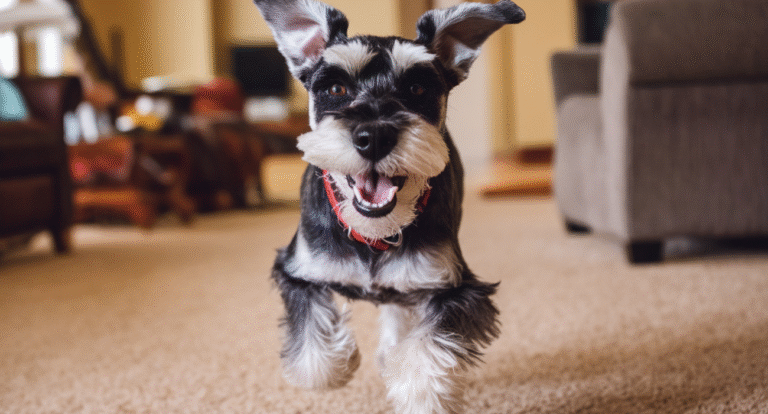Schnauzers often hide their anxiety. Watch for these subtle hints and learn gentle ways to help bring calm and comfort to their world.
Your schnauzer is sitting in the corner, beard twitching, eyes darting around the room like they’re tracking invisible squirrels. Everything seems fine on the surface, but something’s definitely off. Here’s the thing about schnauzers: they’re masters of disguise when it comes to anxiety. Unlike some breeds that wear their stress on their furry sleeves, these intelligent terriers have developed subtle, almost sneaky ways of showing discomfort.
If you’ve ever wondered whether your schnauzer’s quirky behavior is just their personality or something more serious, you’re asking exactly the right question. Let’s decode those mysterious signals together.
1. The Beard Obsession: Excessive Licking and Chewing
That magnificent facial hair isn’t just there for Instagram photos. For anxious schnauzers, their beard becomes ground zero for stress relief behaviors. You might notice your schnauzer obsessively licking their front paws, chewing at their leg fur, or constantly grooming their signature beard area. This isn’t just regular grooming; it’s a coping mechanism.
When anxiety takes hold, schnauzers often turn to repetitive behaviors for comfort. The beard and paws are particularly vulnerable because they’re easily accessible. Over time, this can lead to discolored fur (that rusty brown staining from saliva), skin irritation, or even hot spots. Some schnauzers develop such intense licking habits that they create bald patches around their mouth and legs.
Pay attention to context. If your schnauzer starts their licking marathon every time you grab your car keys or when strangers visit, you’re witnessing anxiety in action, not just a hygiene routine.
What to Do: First, rule out medical causes with your vet (allergies, skin infections, and pain can all trigger licking). Once anxiety is confirmed as the culprit, redirect the behavior with puzzle toys or long lasting chews. Consider a “beard bib” or recovery collar during peak anxiety times to break the habit cycle. Calming supplements containing L-theanine or chamomile can take the edge off, and desensitization training helps address the root cause.
2. Shadowing Behavior: Your Velcro Schnauzer
Schnauzers are naturally loyal, but there’s a difference between enjoying your company and needing your company every single second. An anxious schnauzer transforms into your shadow, following you from room to room, sitting pressed against your legs, and exhibiting panic when you dare to use the bathroom alone. This is called velcro dog syndrome, and it’s more than just devotion.
This behavior stems from separation anxiety or general nervousness about being alone. Your schnauzer has decided you’re their security blanket, and being apart from you, even for a moment, triggers genuine distress. You might notice increased panting, whining, or pacing when you move to another room. Some schnauzers position themselves strategically to watch all doorways, making sure you can’t escape their surveillance.
The challenge is that this behavior feels flattering at first. Who doesn’t want to feel adored? But unchecked, it escalates into a problem where your dog cannot function independently, which isn’t healthy for either of you.
What to Do: Practice independence training in tiny increments. Start by rewarding your schnauzer for staying in place while you step a few feet away. Gradually increase distance and duration. Create a cozy “safe space” (crate or bed) where they receive special treats and toys only available in that spot. Use baby gates to create physical boundaries so they can see you but can’t follow. Consider calming pheromone diffusers like Adaptil, and teach a solid “place” or “stay” command with high value rewards.
3. The Schnauzer Stare: Fixed Eye Contact and Hypervigilance
Schnauzers have naturally intense expressions (those eyebrows don’t help), but anxious schnauzers take it to another level. They develop what behaviorists call “hypervigilance,” constantly scanning their environment and staring fixedly at potential threats. You’ll catch them staring at doorways, windows, or specific spots in the house for extended periods, muscles tense and ready to spring into action.
This behavior connects to their terrier heritage. Schnauzers were bred to be alert watchdogs, but anxiety amplifies this trait into overdrive. Instead of relaxing between alerts, an anxious schnauzer remains in perpetual guard mode. Their body language tells the story: rigid posture, ears perked forward, minimal blinking, and sometimes a low growl or raised hackles.
| Normal Alertness | Anxiety Driven Hypervigilance |
|---|---|
| Brief attention to sounds/movement | Prolonged, intense staring (5+ minutes) |
| Relaxed body between alerts | Constant tension, unable to settle |
| Easy to distract with treats/toys | Ignores redirection attempts |
| Returns to resting position | Remains in alert stance repeatedly |
| Investigates then moves on | Obsessive focus on same spots |
What to Do: Environmental management is key. Block visual access to triggers (close curtains, use privacy film on windows, rearrange furniture). Provide mental enrichment throughout the day to tire that active schnauzer brain. Practice “look at that” training where you reward your schnauzer for calmly noticing triggers then looking back at you. This teaches them the trigger isn’t threatening and that checking in with you is rewarding. Calming music or white noise can mask triggering sounds. In severe cases, consult a veterinary behaviorist about anti-anxiety medication.
4. Appetite Changes: The Picky Eater Phenomenon
Schnauzers typically have healthy appetites, making sudden pickiness a red flag. An anxious schnauzer might sniff their food and walk away, eat only when you’re present, or become obsessively food aggressive. Stress affects the digestive system in dogs just like humans; that nervous stomach translates to decreased interest in meals.
Some anxious schnauzers show the opposite behavior, becoming food obsessed and constantly begging or scavenging. This stems from stress eating, where consuming food provides temporary comfort and distraction from anxious feelings. You might notice your schnauzer suddenly raiding trash cans, counter surfing, or fixating on mealtimes with unusual intensity.
Either extreme (not eating or overeating) signals that something’s wrong emotionally. Weight loss or gain can happen quickly, especially in Miniature Schnauzers with their smaller frames.
Food isn’t just fuel for dogs; it’s a barometer of emotional wellbeing. Changes in eating patterns deserve immediate attention, whether the issue is medical or psychological.
What to Do: Establish a consistent feeding schedule in a quiet, low traffic area. Use puzzle feeders or slow feed bowls to make meals more engaging and less rushed. If your schnauzer won’t eat unless you’re present, gradually work on independence by starting meals together, then stepping away for increasing intervals. For food aggressive behaviors, consult a professional trainer immediately (this can become dangerous). Rule out dental issues, gastrointestinal problems, or other medical causes with your vet before treating as purely behavioral.
5. The Invisible Tail Wag: Body Language Shutdown
Here’s where schnauzers really trick their owners. Unlike breeds with expressive tails, schnauzers often have docked tails (or naturally shorter tails depending on location and breeding), making body language harder to read. An anxious schnauzer might exhibit what trainers call a “body language shutdown,” where they become eerily still and quiet instead of showing obvious distress.
Watch for these subtle cues: tail tucked tightly (or the stub held very low), ears pinned back against their head, whale eye (showing the whites of eyes), lip licking or yawning when not tired, and a lowered body posture. Your schnauzer might freeze in place, refusing to move forward on walks or entering certain rooms. This isn’t stubbornness; it’s fear.
The shutdown can be so complete that owners mistake it for calm behavior. “He’s being so good and quiet” might actually mean “He’s so anxious he can’t process what to do.” This is particularly common in schnauzers who’ve been punished for showing anxiety symptoms like barking or pacing. They learn to suppress external signs while the internal stress continues building.
What to Do: Never force a shutdown schnauzer into feared situations. Use desensitization and counterconditioning protocols, pairing scary things with extremely high value treats. Work below your dog’s threshold (the point where they show stress). Learn to read subtle body language through photos and videos of canine stress signals. Speak in soft, encouraging tones and allow your schnauzer to approach new things at their own pace. Consider working with a certified professional dog trainer (CPDT) or veterinary behaviorist who uses positive reinforcement methods exclusively.
Remember: anxiety is treatable. With patience, proper management, and sometimes professional help, your schnauzer can learn to navigate the world with confidence instead of constant worry.
Understanding these hidden anxiety signals transforms how you interact with your schnauzer. These bearded companions trust us completely, and recognizing when they’re struggling emotionally is part of being a responsible owner. Whether it’s the beard chewing, velcro behavior, hypervigilance, appetite changes, or body language shutdown, each signal is your schnauzer’s way of saying, “I need help here.”
The good news? Schnauzers are incredibly smart and respond beautifully to consistent, positive training approaches. Most anxiety issues improve significantly with environmental modifications, behavior modification training, and occasionally veterinary intervention. Your schnauzer doesn’t have to live in constant stress, and you don’t have to feel helpless watching them struggle. Start paying attention to these subtle signs today, and you’ll build an even stronger, more trusting relationship with your wonderfully whiskered friend.






